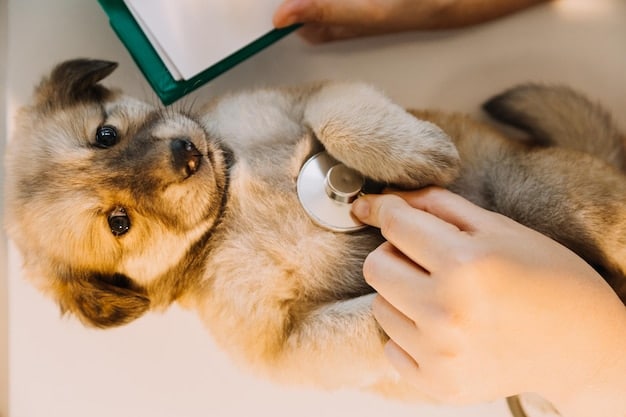How to Choose the Right Veterinarian: Finding the Best Care for Your Pet

Choosing the right veterinarian involves considering factors like location, services offered, staff compassion, and client reviews to ensure your pet receives the best possible care and builds a trusting, lasting relationship.
Finding the right veterinarian is crucial for ensuring your pet’s health and well-being. Your furry friend deserves the best possible care, and **how to choose the right veterinarian: finding the best care for your pet** involves careful consideration of several important factors.
Factors to Consider When Choosing a Veterinarian
Selecting a veterinarian is a significant decision that impacts your pet’s health and happiness. It’s essential to consider various factors to ensure you find a professional who meets your pet’s specific needs and your expectations. Here are some key elements to evaluate during your search.
Location and Accessibility
The veterinarian’s location is a practical consideration. A nearby clinic can be a lifesaver in emergencies and makes routine check-ups more convenient. Consider traffic patterns and parking availability as well.
Services Offered
Different clinics offer different services. Ensure the veterinarian provides the services your pet might need, such as vaccinations, dental care, surgery, and emergency services. Some may also offer specialized services like acupuncture or behavioral counseling.

Here are some points to note:
- Check if the clinic offers emergency services or has a partnership to provide after-hours care.
- Ask about their capabilities for handling various types of pets, especially if you have exotic animals.
- Inquire about preventive care programs and wellness plans.
Ultimately, choosing a vet based on location and services ensures that your pet receives prompt and comprehensive care whenever needed, contributing to their long-term health and well-being.
Assessing the Veterinarian’s Qualifications and Experience
It’s crucial to verify the veterinarian’s credentials and experience to ensure they are qualified to provide the best possible care for your pet. Checking their qualifications helps establish a level of trust and confidence in their abilities.
Education and Licensing
Confirm that the veterinarian is licensed to practice in your state. Licensing ensures they have met the required educational standards and passed necessary examinations. You can usually verify this information through your state’s veterinary medical board website.
Experience with Specific Animals
If you have a specific type of pet, such as a reptile or bird, ensure that the veterinarian has experience treating those animals. Not all veterinarians are comfortable or knowledgeable about treating every type of pet.
- Ask about their experience with your specific breed or species.
- Look for certifications or additional training in specialized areas.
- Read online reviews or testimonials to see what other pet owners say about their experiences.
Choosing a veterinarian with the right qualifications and experience provides peace of mind, knowing your pet is in capable hands. This due diligence ensures your furry companion receives the best possible care tailored to their unique needs.
Evaluating the Clinic’s Environment and Cleanliness
The environment of the veterinary clinic is as important as the qualifications of the veterinarian themselves. A clean, well-maintained clinic indicates that the staff takes their responsibilities seriously and prioritizes the health and safety of their patients. Observing the clinic’s environment can provide valuable insights into the standards of care provided.
Cleanliness and Hygiene
A clean clinic minimizes the risk of infections and diseases. Pay attention to the overall cleanliness of the waiting area, examination rooms, and surgical suites. Look for visible signs of cleanliness, such as sanitized surfaces and proper waste disposal.
Equipment and Technology
Modern veterinary clinics should have up-to-date equipment that aids in accurate diagnoses and effective treatments. This includes digital X-ray machines, ultrasound equipment, and advanced monitoring systems.

Points to note:
- Observe if the clinic uses disposable gloves and sterilizes instruments properly.
- Check if the clinic has a designated area for infectious diseases to prevent cross-contamination.
- Ask about their protocols for maintaining a sterile environment during surgical procedures.
By carefully evaluating the clinic’s environment and cleanliness, you can ensure your pet receives care in a safe and hygienic setting. A well-maintained clinic reflects a commitment to providing high-quality veterinary services and protecting your pet’s health.
Checking Reviews and Testimonials
In today’s digital age, reviews and testimonials offer a wealth of information about the experiences of other pet owners with a particular veterinarian. These insights can provide valuable perspectives on the quality of care and customer service provided.
Online Reviews
Websites like Yelp, Google Reviews, and Facebook are excellent resources for reading reviews. Pay attention to the overall rating and read a variety of reviews to get a balanced view. Look for recurring themes, both positive and negative.
Testimonials
Many veterinary clinics feature testimonials on their websites. While these are often curated, they can still provide insights into the types of cases the clinic handles and the level of satisfaction among clients.
Consider these aspects:
- Look for reviews or testimonials that specifically mention the veterinarian’s bedside manner.
- Pay attention to how the clinic responds to negative reviews. A professional and empathetic response can indicate a commitment to customer service.
- Ask friends, family, or neighbors for recommendations and personal experiences.
Taking the time to check reviews and testimonials can help you make an informed decision about choosing a veterinarian. These insights can reveal valuable information and ensure your pet receives care from a trusted and well-regarded professional.
Considering the Veterinarian’s Communication Style and Compassion
Effective communication and compassion are essential qualities in a veterinarian. A good veterinarian should be able to explain medical information clearly, answer your questions thoroughly, and demonstrate genuine care for your pet’s well-being. This helps build a strong, trusting relationship and ensures you are well-informed about your pet’s health.
Communication Skills
A veterinarian should be able to explain complex medical concepts in a way that is easy to understand. They should also be willing to listen to your concerns and answer your questions patiently and thoroughly.
Compassion and Empathy
Look for a veterinarian who shows genuine compassion for animals. They should handle your pet gently and with care, and be sensitive to their needs and fears.
- Observe how the veterinarian interacts with your pet during the examination.
- Ask questions about preventive care and how to maintain your pet’s health at home.
- Pay attention to whether they explain the pros and cons of different treatment options.
Choosing a veterinarian with excellent communication skills and compassion ensures that you and your pet feel comfortable and supported. This fosters a collaborative approach to healthcare, resulting in the best possible outcomes for your furry friend.
Understanding the Costs and Payment Options
Understanding the costs associated with veterinary care and exploring available payment options is essential for responsible pet ownership. Veterinary care can sometimes be expensive, so it’s important to have a clear understanding of the financial aspects. Discussing costs upfront helps avoid surprises and ensures you can provide necessary care without financial strain.
Transparency of Costs
A reputable veterinary clinic should be transparent about their fees. Ask for a detailed estimate before any procedures or treatments are performed. This helps you understand what you are paying for and allows you to make informed decisions.
Payment Options
Inquire about the different payment options available at the clinic. Many clinics accept cash, credit cards, and pet insurance. Some may also offer payment plans or financing options to help you manage costs.
Here’s what you should consider:
- Ask about discounts for seniors or multiple pets.
- Consider enrolling in pet insurance to help cover unexpected medical expenses.
- Look for clinics that offer wellness plans, which can help you budget for routine care.
Addressing the costs and payment options ensures that financial considerations do not hinder your pet’s access to necessary veterinary care. Planning ahead and understanding your options allows you to prioritize your pet’s health without compromising your financial stability.
| Key Point | Brief Description |
|---|---|
| 📍 Location & Accessibility | Choose a vet that is conveniently located and easily accessible for routine visits and emergencies. |
| 🩺 Qualifications & Experience | Verify the vet’s credentials, licensing, and experience with your specific type of animal. |
| ⭐ Reviews & Testimonials | Read online reviews and testimonials to get insights from other pet owners. |
| 💬 Communication & Compassion | Ensure the vet communicates clearly, listens to your concerns, and shows genuine compassion for your pet. |
Frequently Asked Questions
▼
The frequency of vet visits depends on your pet’s age and health. Puppies and kittens need more frequent check-ups for vaccinations and early health monitoring. Adult pets typically benefit from annual visits, while senior pets may need check-ups every six months.
▼
For your pet’s first appointment, bring any previous medical records, a list of medications or supplements your pet is taking, and a stool sample if requested. Also, have your pet on a leash or in a carrier to ensure their safety and comfort.
▼
To prepare your pet, acclimate them to the carrier or leash beforehand. Bring their favorite toys or treats to help them stay calm during the visit. Speak in a soothing voice and remain calm yourself, as pets can sense your anxiety.
▼
Signs that your pet needs to see a vet include changes in appetite or water intake, lethargy, vomiting or diarrhea, coughing or sneezing, difficulty breathing, limping, skin issues, and changes in behavior. If you notice any unusual symptoms, consult your veterinarian promptly.
▼
Conclusion
Choosing the right veterinarian is an investment in your pet’s health and happiness. By considering factors such as location, qualifications, clinic environment, reviews, communication, and costs, you can find a trusted partner in your pet’s care.





